
Naning´oi women group with full tablet equipment like iPad with cover, bag and solar charger, 2016
Report from the field
Since 2012 we are working with „The Real Digital Nomads“ in northern Kenya. From July 2016 till March 2017, we carried out our pilot project funded by the German Federal Ministry of Economic Cooperation and Development (BMZ): “Resilience strengthening of pastoralist women groups through digital Basic Alphabetization with life-relevant materials in form of eBooks“. We used six eBooks (Manyatta, Fora, Town, Drought Resilience, Alternative Livelihoods and Animal Health) in two communities in Marsabit County with five ethnic groups and reached 300 women and young warriors. Malteser International and PACIDA helped us to implement our eeem.org project.
Our eeem.org approach consists of the following modules:
-
ethnographic video and photo materials,
-
eBooks with true-to-life content to playfully learn basic literacy and simple calculations to acquire necessary life skills,
-
tablets with solar charging devices to be mobile and independent and
-
barefoot teachers as multipliers.
Various experts are constantly working hand in hand with the pastoralists themselves as film makers with a profound ethnological background being familiar with development policies, an IT specialist and designer working with eLearning and pedagogy experts. You can download an overview of example pages of our eBooks here.
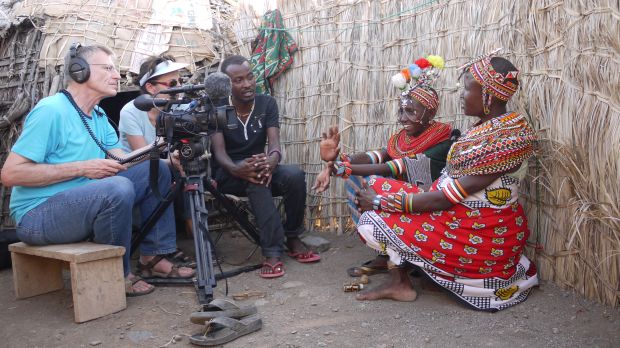
First interviews with chairwomen Talaso and daughter in law Teresia, 2012
We all are kept in a feedback-loop with a cultural anthropologist and the pastoralists since our success criteria are the acceptance, understanding and learning progress of the pastoralists.
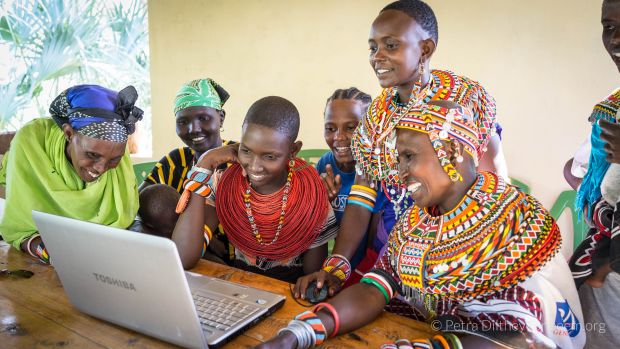
First testing of our eLearning program with Laptop in 2014
Video-report about our pilot project in Loiyangalani (First training July/August 2016)
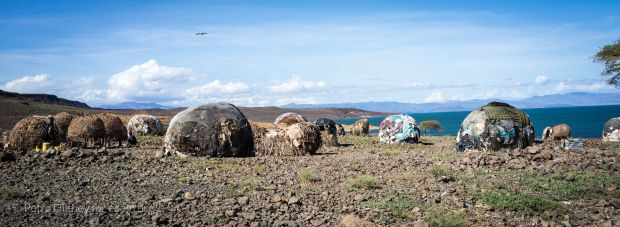
Manyatta at Lake Turkan
We are back from Kenya and are happy to report that the first training workshops for barefoot teachers in Loiyangalani and Hurri Hills were really successful. We introduced the eBooks in 7-day training courses, working very effectively in small groups. The participants became quickly familiar with the iPad and appreciated the eBooks on different levels – because of their content and as learning tools.
Our eBook developer Oliver Kranz has really done a great job in creating playful writing, reading and arithmetic lessons. Even the young warriors were enthusiastic from the first to the last day. At night, they repeated the lessons learned and showed them to their friends. Ibrahim Abdalla from PACIDA made the training fun:
The participants were especially enthusiastic about the chapters on M-Pesa – a mobile money service widely used to make payments in Kenya – and the subject of drought resilience. As one participant put it: “Animals get affected by drought, but not the money in the M-Pesa account.”
Three tablets with six eBooks were distributed to selected barefoot teachers in order to enable them to share their knowledge with village neighbors and warriors. Supervisor Lkotikan Leabora will be in constant contact with Ibrahim to solve any problems as quickly as possible:
Video-report about our pilot project in Hurri Hills (First training August 2016)
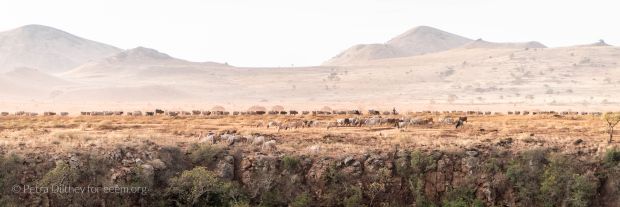
Landscape Hurri Hills
It’s always great to get some encouraging feedback. But we did not expect such a positive reaction that we got from our students of Hurri Hills. See this small footage and hear them with their own words:
Part 2 of our selected statements from the participants in Hurri Hills shows how our students see their new opportunities at the livestock market. Now they know the perfect moment to sell animals during the “drought cycle”.
The eeem.org project opens the door to new opportunities. It not only teaches how to read and write – it even gives our participants the opportunity to learn how to pay and receive money via their mobile phones. That’s a big step towards economic independence.
First Conclusions
The way the participants react to the training indicates that we are on the right track as far as the technical equipment and the content of the eBooks are concerned. Program manager Ibrahim Abdallah from PACIDA wrote in his first report:
„In a wider perspective, the introduction of e-books into beading and livestock rearing had several benefits and outcomes. While e-books, beading, fodder production, M-pesa, scratch cards, resilience to drought and livestock rearing may seem worlds apart, bringing them together did more than simply prove that rural folks can learn to use e-books, if only the activity that the e-books is applied to is relevant to them.“
To further illustrate the effects on the target group here are a few selected statements of the participants of the training:
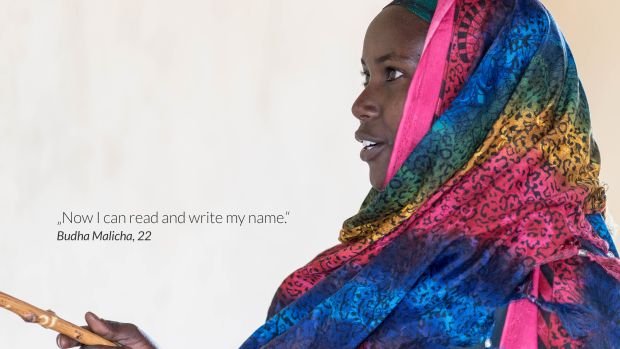
Talaso Lepalat from Loiyangalani says about the peacemaking effect of the project:
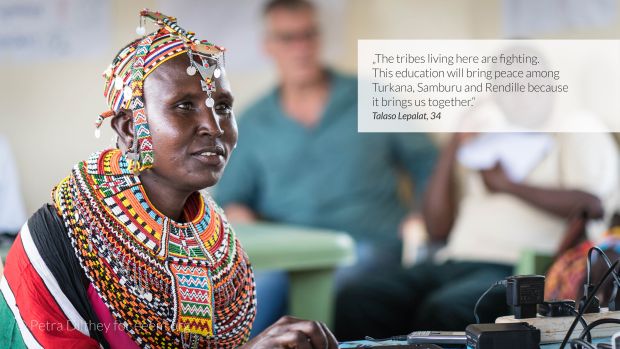
The following statements show the direct effects of learned content:
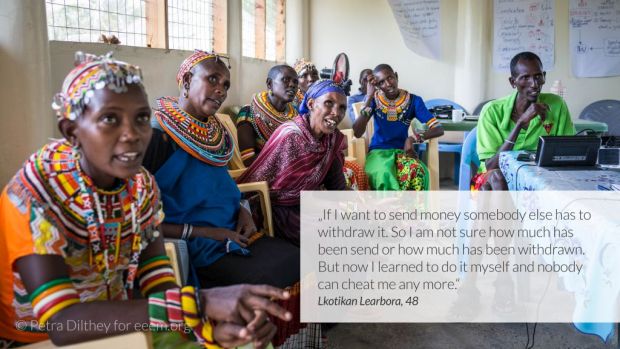
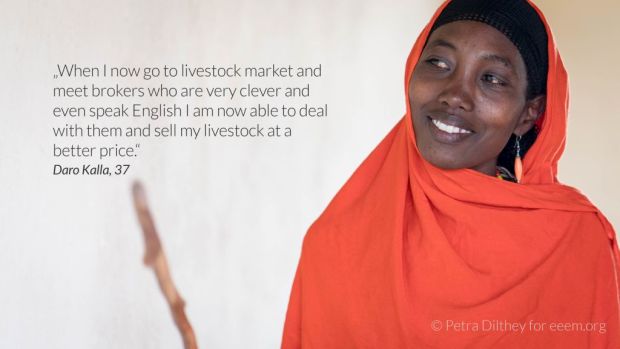
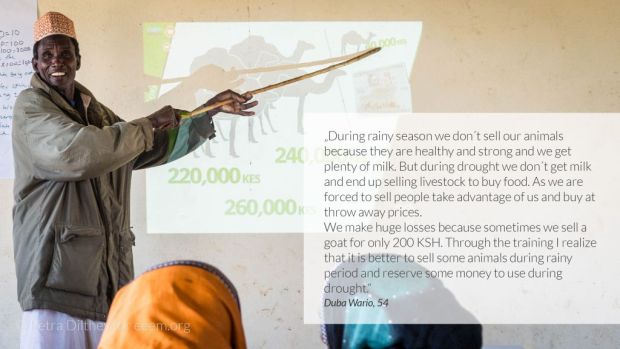
Program manager Ibrahim Abdallah summarises:
„A case in point is that of drought cycle. Most of the learners asserted that drought will not find them unaware again. Based on the knowledge they have gained from the eBooks they can now adequately prepare for drought on which stages of drought cycle they can buy and sell their livestock”.
In view of the extreme drought in 2016/2017 and the dramatic loss of animals the need for such a project on Drought resilience gets evident.
Report about our pilot project (second training November 2016)
Our so-called barefoot teachers play an important part in the eeem.org project.
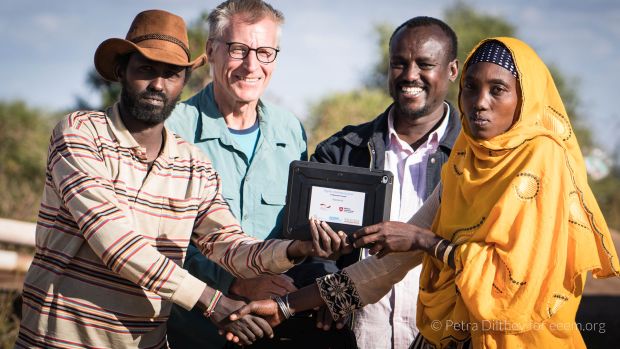
Barefoot teacher Daro gets her equipment from the Deputy chief from Hurri Hills. In the background Uli Schwarz from up4change e.V. and Ibrahim Abdallah from PACIDA.
They find students in the village where they live and teach them how to deal with drought, treat the animals, calculate profits and so on. In this video you are introduced to Daro, one of our barefoot teachers from Hurri Hills. Take a look:
Summary
295 students were reached by the barefoot teachers in Loiyangalani and in Hurri Hills until the end of March. The barefoot teachers in Loiyangalani met 134 students in total. The 3 barefoot teachers in the village taught 2-3 hours 2 times a week. The two Moran in the fora, Safo Ogom and Magan Lemirikakona, who taught each evening for one to two hours, reached 62 students.
In Hurri Hills, 6 barefoot teachers reached 161 students, knowing that Daro Kalla taught at least 2 hours each day.
Considering that over 50% of the project duration fell into a severe drought, the fact that so many students could be addressed is impressive.
|
Hurri Hills |
Loiyangalani |
||
|
Barfoot teacher |
pupils |
Barfoot teacher |
pupils |
|
Daro |
36 |
Safu |
36 |
|
Chula |
38 |
Magan |
26 |
|
Daki |
28 |
Antony |
7 |
|
Konchoro |
26 |
Danila |
15 |
|
Barako |
13 |
Talaso |
15 |
|
Duba |
20 |
Veronica |
26 |
|
Jackson |
9 |
||
|
Subtotal |
161 |
134 |
|
|
Total |
295 |
Quizzes and Lessons learned
The evaluations of the Quizzes of the 3 eBooks Manyatta, Fora and Town result in the following figures and data:
We got online 103 Quizzes from Loiyangalani by the end of March 2017:
Manyatta: 26 women and 05 men = 31
Fora: 40 women and 17 men = 57
Town: 12 women and 03 men = 15
We got offline 147 Quizzes from Hurri Hills by the end of March 2017:
Manyatta: 33 women and 20 men = 53
Fora: 31 women and 20 men = 51
Town: 25 women and 18 men = 43
Total: 250 Quizzes have been done by 132 participants
Lessons learned: Less is more!
It is obvious that we put too much content and too many eBooks in the limited time we had for the project. The already mentioned drought problem made it even worse. Evaluating the few mistakes which were done in the quizzes we have to realize that we could have trained the barefoot teachers in explaining the quizzes a second time. On the other hand the barefoot teachers and their pupils have learned a lot and could even implement their skills to improve their lives. Monitoring and evaluation expert from PACIDA, Joel Kulmicha wrote in his final report:
“Most of the people interviewed observed that the knowledge they have gained helped them organize themselves to respond to problems such as drought and health which they share collectively. This has in turn improved their quality of life”.
Through our eBook „Alternative livelihoods“ the pastoralists got to know the benefits and the profit they can gather by hay making. Watch this short video filmed in Hurri Hills:
Joel Kulmicha summarizes:
“The hay making group in Hurri Hills made good strides. Through their activity of selling the hay to neighbouring districts the members were able to generate revenue enough to buy basic household stuff and send their children to school”.
Lessons learned in Loiyangalani:
There is a part of the project we haven´t mentioned yet. In Loiyangalani the (CBO) Naning´oi women group got the chance to build an internet kiosk. The project provided the money for the plot of land, for building materials and the community constructed the building. The equipment like solar system, satellite internet dish, back-up generator, furniture, a multifunctional printer and two laptops were also provided by the project.
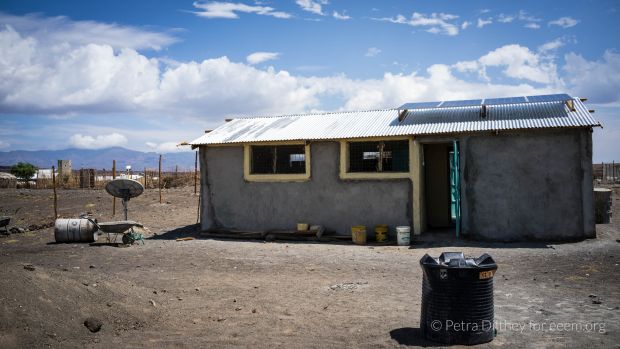
Internet kiosk in construction with satellite dish and solar panels, 2016
The whole Community worked really hard and in only six month all this was achieved and the idea put into practice – the downside: The teaching of the eBooks had been neglected during this period, but afterwards they picked up.
The internet kiosk was officially opened on November 16, 2016:
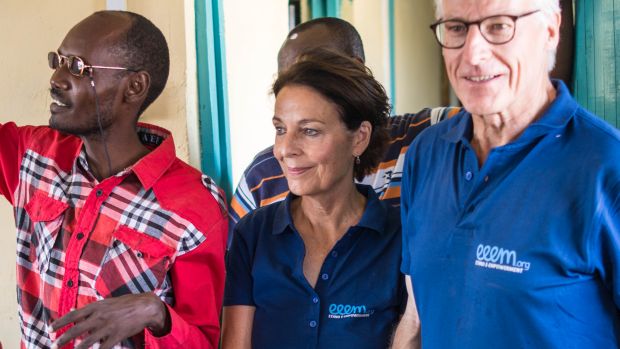
Primary school teacher Ltarawan Ltarakino (l) translated the official speeches to Petra Dilthey and Uli Schwarz from up4change e.V., 2016
And then the work began: Two IT experts worked with the group to teach them all about internet access, passwords, quizzes, etc.
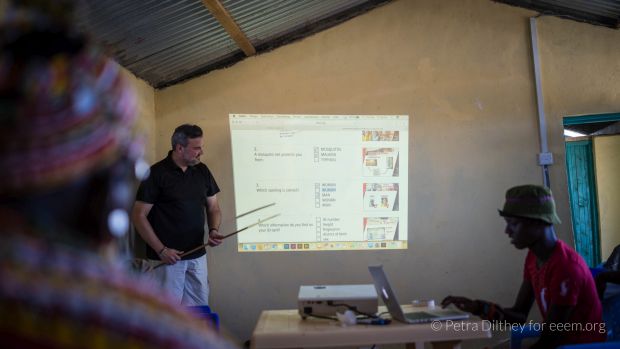
Our eBook developer Oliver Kranz explains the quizzes inside the internet kiosk, 2016
At that time we already realized that especially the laptop PCs were too demanding for the women group. They could handle the iPads without efforts but they had difficulties in handling the PCs.
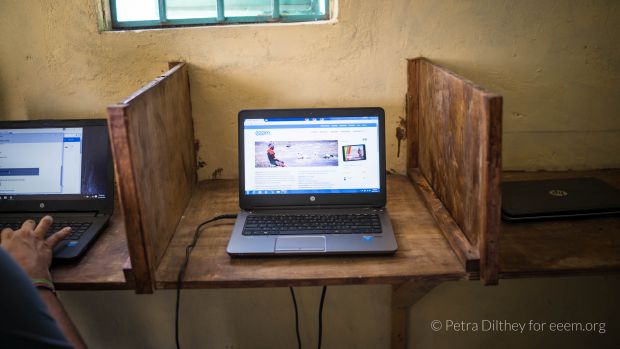
Two Laptops are installed so the group can sell internet time.
Obviously working with windows computers is too demanding in terms of language capabilities.
Fortunately the group could work together with Jackson and Veronica, who both went to secondary school and could understand and use the required language. Months later we got to know that one of the laptops had been infected by a virus. It took some time to debug it.
Nevertheless the women group has been running the kiosk as a sustainable business.
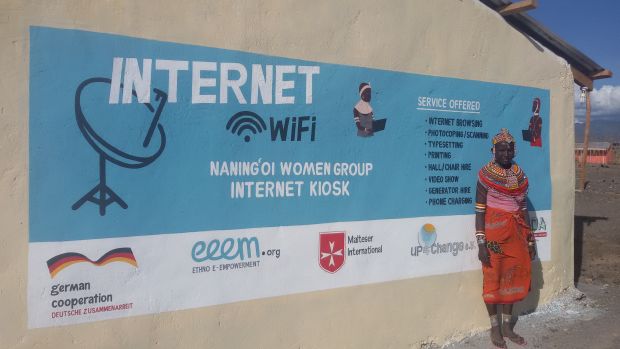
Talking wall of the internet kiosk, 2017
Here is the price list of their services:
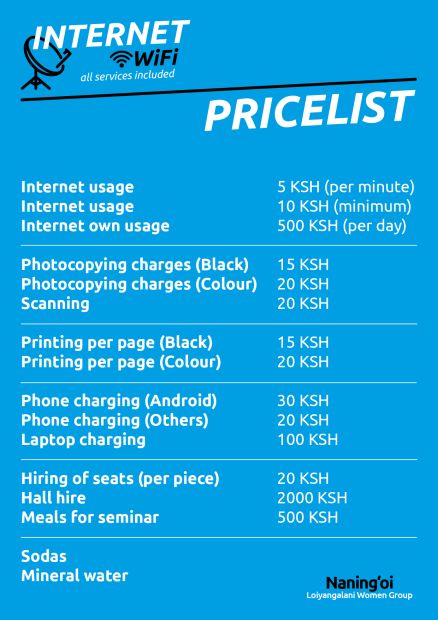
Our aim is clear: We want to prepare them up to web literacy, but this takes time, a lot of training and different computers. The eagerness to learn and the courage to run the business is evident:
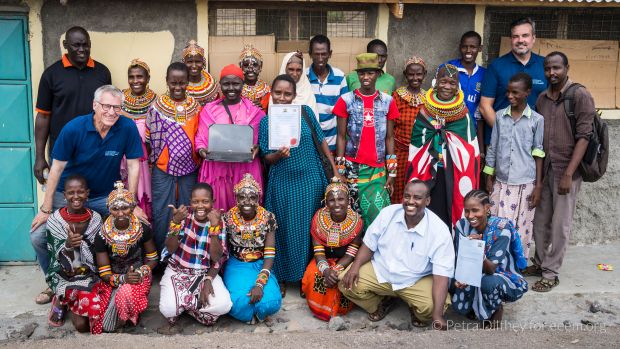
Summary
Program manager Ibrahim Abdallah from PACIDA concludes his final report:
“The urge to learn among the pastoralist is high and the programme came at the right time when the elderly and those who not had the opportunity to go to school had despair and regarded them as the forgotten lot. As one barefoot teacher would put it “I never thought I will have the opportunity to learn again let alone being a teacher. To be exposed to technology through tablets is something I never dreamt of let alone think of it.”
The hunger of learning that Ibrahim addresses is strengthened by our following observations: Already on the fourth day of our first training in Loiyangalani, Moran Safo Ogom asked us for a tablet to teach his fellow Moran in the evening. The Naning`oi women group paid Primary school teacher Ltarawan Ltarakino to give them standard literacy lessons twice a week in addition to the eBook training courses till now. And they asked us for further internet and computer trainings. The Adult Education Officer Mr Gichohi who took part in the trainings created two new Adult Education jobs in Loiyangalani. Keeping in mind that 90% of the pastoralists in this region are illiterate, our pilot project plays an important role in tackling this problem.
Concerning the small children who always had been around and were eager to learn with their parents, they not only get used to modern technology but also get introduced to cultural based learning content which lacks in the normal school curriculum. This is the first step to an educational system which integrates pastoral lifestyle.

Barefoot teacher Veronica (Turkana) with kids of her village, 2016
Final Conclusion
“If this project was to be integrated into bigger picture of pastoralist communities grounded in experience gained from the two project sites then this will ultimately lead to best practice in the long run” (Joel Kulmicha, monitoring and evaluation expert, PACIDA).
Pastoralists must be able to meet the requirements of modernity in the face of prolonged periods of drought due to climate change. With the tailor-made digital learning content, this can be achieved quickly and effectively. The barefoot teachers as multipliers in the community work better than previous educational offers.
We see our project as an important contribution to the resilience of nomadic societies. The economic viability of the project continues to unfold. As the pastoralists have learned to deal with drought cycles, sell their animals in time and save the money on their Mpesa account they will remain independent in times of need and do not have to rely on emergency aid. This goal requires that the project be continued, scaled and intensified over a longer period of time.
Petra Dilthey und Uli Schwarz
